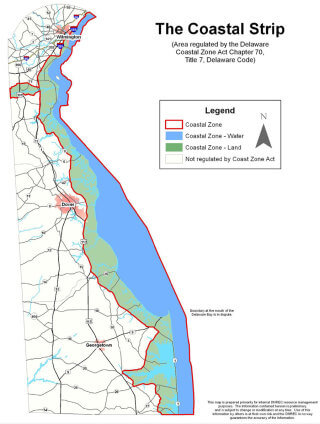
September 12, 2020
An amendment is being proposed to the Coastal Zone Act that could open up doors for big polluters along the Delaware River and Delaware beaches. The coastal environment, drinking water, and down-state economy is at risk.
House Bill 190, amending Delaware’s Coastal Zone Act, passed the House yesterday in a 34-7 vote. Several amendments were added on the floor yesterday that strengthens the language around the regulatory timeline, sea-level rise, financial assurance, and bulk product transfer. More about what this means, below.
What is the Coastal Zone Act?
The Coastal Zone Act (CZA) is an environmentally conscious law that was introduced in 1971 that restricts the industries that may be built along Delaware’s coastal zone (see map). It has been regarded by environmentalists as one of the most significant pieces of environmental legislation in recent times. Not only does the CZA restrict what types of industries can be built along the coastal zone, it also restricts what can be shipped. In particular it restricts “bulk transfers”.
The CZA is paramount to the protecting the integrity of the coastal environment along the Delaware River and the Delaware beaches.
What are “Bulk Transfers”?
Bulk transfer is when the substance that’s being shipped sits in the hull of a boat and gets pumped in and out during transfer. This is distinctly different from cargo that’s shipped in boxes or containers. Substances shipped by bulk transfer can take a liquid form (like hydrocarbons, petrochemicals, or harmful concrete ingredients) or solid form (such as salt, sand, or grain). The potential danger of bulk transfer depends on the substance that’s being transferred, and is only harmful in the case of a spill. Spills aren’t particularly likely, but have devastating consequences. A single spill can ruin the entire length of our state’s coastal zone and cause millions of dollars in damage to our economy. This is why the CZA specifies strict prohibition of bulk transfers.
Why is there a bill trying to change the CZA?
HB-190 is billed as an attempt to boost the state’s economy by lifting restrictions on particular industries (think fossil fuels). Many Delawareans are left wondering why we should be supporting dying industries while sacrificing the well being of our natural resources and putting the health of our people and integrity of beaches at risk. The inclination towards energy development along our state’s coastal zone primarily exists because that is what has traditionally occupied this space in the past. But the CZA, although restrive on heavy industrial facilities, has no restrictions on a plethora of other industries. Some point out that we are much more creative than this. We could develop a thriving tech sector or top notch research facilities while decreasing our dependency on fossil fuels and strengthening our economy. There is a growing belief that Delaware should be moving away from the petrochemical industry and supporting younger, more promising industries instead.
Why is HB-190 bad for Delaware?
The particular problem we have with the CZA amendment is how it deals with bulk product transfers. There are 14 heavy industry sites that were grandfathered into the CZA when it was enacted. The act allows for these sites to continue their industrial use. HB-190, however, extends the ability of these original industries to expand and build new bulk transfer facilities (which wasn't allowed in 1971). Bulk transfer spills put the entire coastline at risk - including the health of our residents, environment, and economy. A chemical spill in Wilmington would be devastating to everyone downstream. There would be an enormous economic impact of having to clean up hundreds of miles of coastline while shutting down the Delaware beaches until the integrity of the water had been restored. By allowing bulk transfer the state would be assuming huge risks at a nominal gain.
Until common-sense environmental amendments to HB-190 have been discussed, we support strict prohibition of bulk transfers in the CZA, as it was originally intended.

HB-190 has passed the state House and moved onto the state Senate. It is currently unclear whether the bill will go to the Senate floor for a vote or whether it will go to “committee hearing” where a discussion can take place to amend the bill. This gives the senate the opportunity to discuss concerns, collect public input, and ultimately rewrite or amend the bill.
Now that it has passed the House, the Senate has become the primary target. Specifically, we are asking people to call or email Senator McDowell, Senator McBride, Senator Poore, Senator Sokola, Senator Delcollo, and Senator Simpson. Don’t be afraid to call. You’ll be greeted by a friendly legislative aide who will quietly listen to what you have to say. They won’t argue or press you further on your opinion.
1. Find your state senator
Now that it has passed the House, the Senate has become the primary target. Specifically, we are asking people to call or email Senator McDowell, Senator McBride, Senator Poore, Senator Sokola, Senator Delcollo, and Senator Simpson. Don’t be afraid to call. You’ll be greeted by a friendly legislative aide who will quietly listen to what you have to say. They won’t argue or press you further on your opinion.
2. Call or email them
Delaware Senators
(302) area code...
(R) Colin Bonini 744-4169 - Colin.Bonini@state.de.us
(D) Brian Bushweller 744-4162 - Brian.Bushweller@state.de.us
(R) Catherine Cloutier - 478-9616 - Catherine.Cloutier@state.de.us
(R) Anthony Delcollo - 744-4306 - Anthony.delcollo@state.de.us
(D) Bruce Ennis 744-4310 - Bruce.Ennis@state.de.us
(R) Gerald Hocker 744-4144 - Gerald.Hocker@state.de.us
(R) Gregory Lavelle - 744-4197 or 744-4135 - Greg.Lavelle@state.de.us
(R) David Lawson 744-4237 - Dave.Lawson@state.de.us
(R) Ernesto Lopez - 744-4136 - Ernesto.Lopez@state.de.us
(D) Robert Marshal - 744-4168 - Robert.Marshall@state.de.us
(D) Stephanie Hansen 302-744-4138 - Stephanie.Hansen@state.de.us
(D) Harris McDowell - 744-4147 - Harris.McDowell@state.de.us
(D) David B. McBride 744-4167 - David.McBride@state.de.us
(R) Brian Pettyjohn 744-4117 - Brian.Pettyjohn@state.de.us
(D) Nicole Poore 744-4164 - Nicole.Poore@state.de.us
(R) Bryant Richardson 744-4298 - Bryant.Richardson@state.de.us
(D) Margaret Rose Henry - 744-4191 - MargaretRose.Henry@state.de.us
(R) F. Gary Simpson 744-4134 - Gary.Simpson@state.de.us
(D) David Sokola 744-4139 - David.Sokola@state.de.us
(D) Bryan Townsend 744-4165 - Bryan.Townsend@state.de.us
(D) John Walsh 744-4163 - John.Walsh@state.de.us
Provide your full name and address so your call can be tallied. If calling, ask to speak with Senator ___’s office. Sometimes when calling in you’ll get the general desk.
Now that it has passed the House, the Senate has become the primary target. Specifically, we are asking people to call or email Senator McDowell, Senator McBride, Senator Poore, Senator Sokola, Senator Delcollo, and Senator Simpson. Don’t be afraid to call. You’ll be greeted by a friendly legislative aide who will quietly listen to what you have to say. They won’t argue or press you further on your opinion.
3. Ask the following:
Dear Senator _______,
Hi, my name is ___[full name]____ and I live at __________. I am concerned about House Bill 190 that has reached the DE senate. In its current state it has neglected to address the potential impacts to our economy, health, and environment in allowing industrial facilities to expand their operations. I oppose legislation that allows harmful substances to be shipped through bulk transfer. I am concerned that the expansion of such facilities could also have negative impacts on our coastal environment. I ask the following:
First, I strongly urge Senator [ ______ ] to bring HB-190 to a committee hearing. If HB-190 were to pass there needs to be thorough discussion on restrictions to bulk transfer allowable materials as well as and restrictions on how facilities are built along sensitive environmental areas as to mitigate environmental impacts. I urge Senator [ ________ ] to specify a list of what can be transferred, restricted solely to inert substances (like grain or soybeans) as opposed to harmful petrochemicals or corrosive industrial materials.
If the bill does go to the senate floor for a vote as is, oppose it outright to continue the prohibition of such facilities that the bill was created to restrict! Thank you for your time.
Tips:
Follow-up
We expect that the Senate Natural Resources Committee will meet next Wednesday, June 28th. However, there is a possibility the Senate will suspend the rules and not allow for a public hearing which will result in the bill going to the floor for a vote without public input. In any correspondence with Senator McBride and Senator McDowell, please specifically include a request that this bill receive a committee hearing.
Want to stay updated about the CZA? Follow "Delaware's Coastal Zone Act" on facebook:
https://www.facebook.com/DelawareCZA/